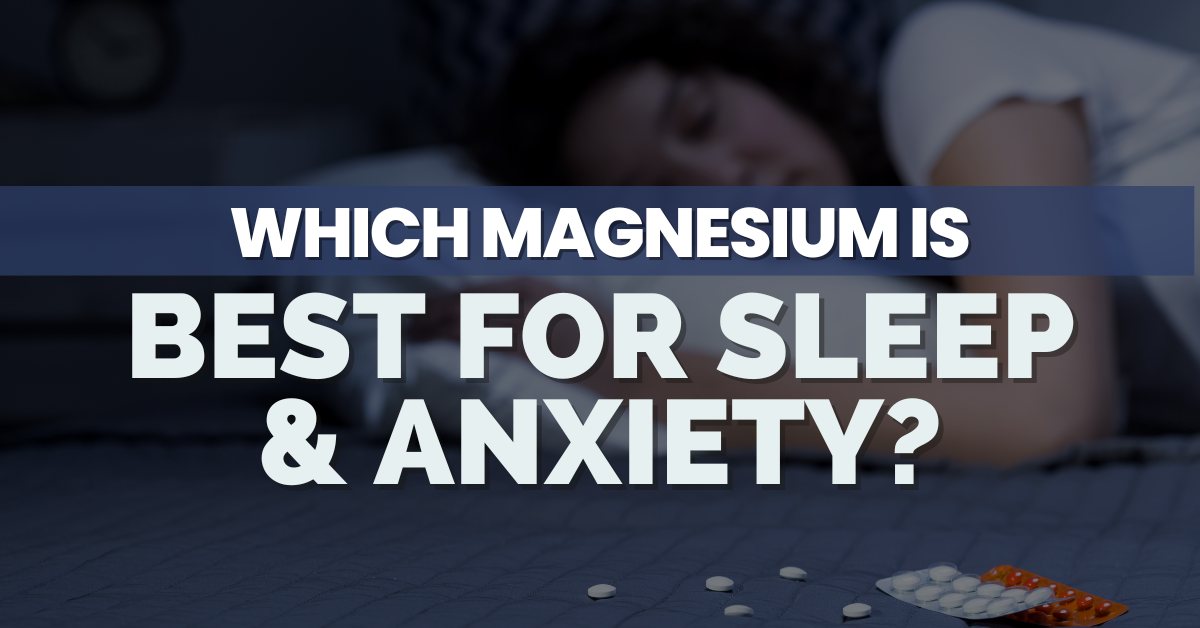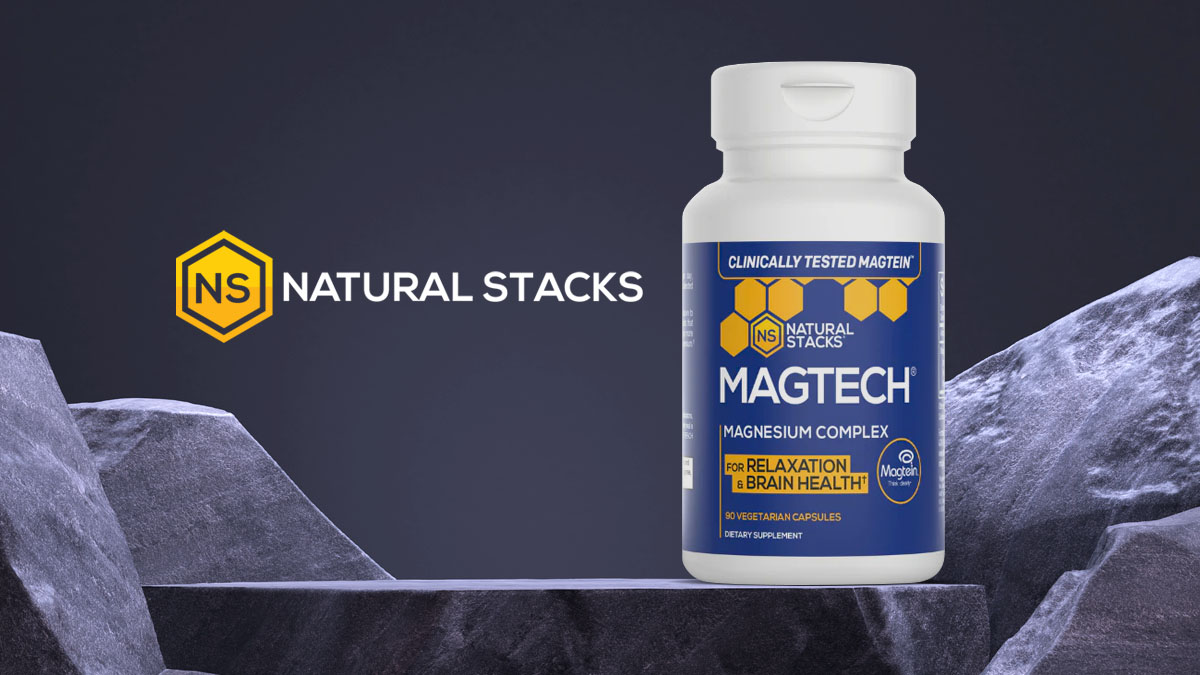
Which Magnesium Is Best for Sleep and Anxiety? Facts + Products
A good night’s sleep is one of the most overlooked things contributing to good health.
If you’re not sleeping much or as well as you’d like, you should consider taking a magnesium supplement. It’s all-natural (you already have some in your body), and it may help reduce stress and anxiety, consequently improving sleep.
But which magnesium is best for sleep and anxiety? This article explains how magnesium is beneficial and the best types to consider. We will also review the best magnesium supplements, like BIOptimizers Magnesium Breakthrough, so that you can make the right choice.
What Is Magnesium?
The human body contains about 25 grams of Magnesium, with approximately 55% present in the bones and much of the remainder in soft tissues. Magnesium contributes to over 300 enzyme systems and helps regulate many diverse chemical interactions in the body. Among these are protein synthesis, blood glucose levels, blood pressure, the development of bone structure, DNA and RNA synthesis, and normal heart rhythms [1].
How Does Magnesium Work for Sleep and Anxiety?
Magnesium supplements are commonly used for several things, but what does magnesium specifically have to do with sleep and anxiety? Let’s look at which magnesium is best for sleep and anxiety.
Magnesium for Sleep
For starters, magnesium may increase gamma-aminobutyric acid (GABA) in the brain, which slows down brain activity and produces an overall calming effect. Magnesium may also help boost melatonin production, a hormone important in your body’s sleep cycle, a.k.a. “circadian rhythm.
Magnesium for Anxiety
Suppose you’re wondering what the benefits of taking magnesium for anxiety are. In that case, the first is that it helps regulate cortisol levels in the body, a chemical that can magnify anxiety levels. Magnesium also helps balance the neurotransmitters in your brain or the on-and-off switches that trigger stress reactions.
Which Magnesium Is Best for Sleep and Anxiety?
Magnesium glycinate is widely considered the best magnesium supplement for sleep and anxiety. This form of magnesium is bonded to glycine, an amino acid with calming properties, making it particularly effective for improving sleep quality and reducing anxiety.
It is easily absorbed and less likely to cause gastrointestinal discomfort compared to other forms of magnesium, making it an ideal choice for those looking to manage sleep issues and anxiety.
Types of Magnesium
There are several types of magnesium supplements available, each with specific uses and benefits. Here are some of the common types:
Magnesium Glycinate
This magnesium supplement combines magnesium with an amino acid known as glycine.
Magnesium glycinate is available in several forms, including tablets, gummies, and powder. It is the most bioavailable form of magnesium, and it may help relieve anxiety, maintain normal heart rhythms, enhance bone health, and even reduce chronic pain and premenstrual syndrome symptoms.
Magnesium Citrate
Magnesium citrate is a salt made by combining magnesium oxide and citric acid. This form is famous as a supplementary sleep aid because it is highly bioavailable and comes in powder, capsule, and liquid form.
Magnesium citrate is also an osmotic laxative that draws water into the intestine to soften stool and make it easier to eliminate. This form of magnesium is often used before intestinal surgeries to remove excess waste [2].
Magnesium L-Threonate
This supplement combines magnesium with threonic acid, a by-product of vitamin C.
Magnesium l-threonate is designed to be more bioavailable than other forms of magnesium and comes in liquid, capsule, or powder form. This supplement has been known to help with sleep, overall cognitive function, focus, and memory [3].
Magnesium Taurate
Magnesium taurate is made by combining magnesium with the amino acid taurine. Available in pills and powders, this supplement helps reduce blood pressure and has beneficial cardiovascular effects due to its power to minimize cell damage from oxidative stress [4].
Magnesium Oxide
Magnesium oxide is an inorganic salt of magnesium made from magnesium and oxygen ions. It usually comes in powder or capsule form and treats migraines and constipation. Magnesium oxide is also reputed to be able to effectively lower blood pressure and blood sugar levels [5].
Magnesium Supplements
Magnesium supplements are widely used to address various health issues besides sleep and anxiety. Here’s a brief overview of a few top supplements in the market today and their common uses:
1. BIOptimizers Magnesium Breakthrough – Best Overall

Money-Back Guarantee: 1 year
Return Policy: 1 year
Cost Per Dosage: $1.67
Pros
- Promotes deep and restful sleep
- Key building block for strong bones
- Enhances a balanced stress response
- Ideal for healthy immune responses
- Informed-Sport supplement certification
Cons
- Free shipping only for bulk orders
Overview
No need to worry about which magnesium is best for sleep and anxiety anymore because this supplement treats both issues. Tested by the reputable Informed Sports Quality Assurance Program, Magnesium Breakthrough provides 7 different forms of magnesium, including glycinate, taurate, and citrate.
Manganese and vitamin B6 are also added. These 7 forms allow for a more balanced supplementation that will help improve mental health, stress responses, and relaxation and set the stage for a great night’s sleep.
Ingredients
- Magnesium Chelate: Easily absorbed form and supports deeper, restorative sleep [6].
- Magnesium Citrate: Magnesium citrate is known for calming nerves and may help reduce anxiety for a peaceful night [2].
- Magnesium Bisglycinate: Gentle on the stomach and effective for relaxation and better sleep [7].
- Magnesium Malate: This type is energizing, yet it can help improve sleep quality due to its muscle-relaxing properties [8].
- Magnesium Sucrosomial: With superior absorption, it effectively promotes relaxation and sleep [9].
- Magnesium Taurate: Combines with taurine to enhance calming effects, aiding sleep and reducing anxiety [4].
- Magnesium Orotate: This form supports heart health, indirectly promoting better sleep and stress management [10].
Price
- 1 Bottle: $35.20
- 3 Bottles: $87.60
- 5 Bottles: $136
User Reviews
BIOptimizers Magnesium Breakthrough receives glowing reviews from many users, scoring 4.5/5 stars on Amazon. They love that it helps them fall asleep effortlessly and wake up feeling well-rested, with the bonus of glowing skin. But, there are some downsides—after a few days of use, some people experience stomach cramping and diarrhea.
2. Organixx Magnesium 7 – Best for Relaxation
Money-Back Guarantee: 1 year
Return Policy: 1 year
Cost Per Dosage: $1.33
Pros
- Offers 7 types of magnesium
- Chelated for maximum absorption
- Non-GMO and no fillers, preservatives, or additives
- Tested by the National Sanitation Foundation (NSF)
Cons
- Customers complain about slow shipping
Overview
Concerning the question of which magnesium is best for sleep and anxiety, Organixx Magnesium 7 is one of the most suitable options. That’s because it’s a third-party tested product containing 7 essential types of magnesium plus vitamin B6.
In addition, it’s free of soy, gluten, GMO, yeast, starch, sodium, and stearate. So, if you’re looking for a more restful and restorative sleep, better nutrient absorption, and reduced anxiety, roll yourself a lucky seven with Magnesium 7.
Ingredients
- Magnesium Chelate: Enhances sleep quality by regulating neurotransmitters that calm the nervous system [6].
- Magnesium Glycinate: Promotes relaxation and reduces anxiety, aiding in a restful night’s sleep [7].
- Magnesium Aspartate: When combined with zinc, it supports the body’s stress response system, helping to alleviate anxiety and improve sleep [11].
- Magnesium Malate: Known for its ability to soothe muscle tension and improve sleep quality [8].
- Magnesium Orotate: Assists in the recovery of the nervous system, contributing to better sleep and reduced anxiety [10].
- 2 mg Vitamin B6: Essential for neurotransmitter synthesis, which can improve mood and reduce symptoms of anxiety [12].
- 1 mg Manganese: Plays a role in brain health and can help regulate sleep patterns, aiding in anxiety reduction [13].
Price
- 1 Bottle: $39.95
- 2 Bottles: $77.90
- 3 Bottles: $110.85
- 6 Bottles: $209.70
You can subscribe and get 15% off your purchase anytime.
User Reviews
On Amazon, Organixx Magnesium 7 has fans who call it a wonder supplement, praising its ability to treat issues such as muscle and sleep problems. However, there’s a downside: the shipping can be slow. Some customers report having issues with their orders and say they had to cancel them out of frustration.
3. Organifi Essential Magnesium – Best for Sleep
Money-Back Guarantee: 60 days
Return Policy: 60 days
Cost Per Dosage: $0.5
Pros
- Easy-to-take capsules
- Vegan friendly
- Promotes healthy muscles and strong bones
- Boosts nerve health and communication
Cons
- May cause stomach upset
Overview
Containing only magnesium glycinate as the key ingredient, the most bioavailable form of magnesium that’s easy on your digestion, Organifi’s Essential Magnesium is the best magnesium glycinate for sleep.
Plus, it may improve muscle and nerve function so your body can work in calm and relaxed harmony. If you want more energy and better rest, Organifi Magnesium is essential.
Ingredients
- 150 mg Magnesium Glycinate: This combination provides a synergistic effect that can be particularly effective for sleep and anxiety. Magnesium improves neurotransmitter function and muscle relaxation, while glycine enhances sleep quality and mood regulation [7].
Price
- 1 Bottle: $30
- 3 Bottles: $71.85
- 6 bottles: $135.12
User Reviews
Amazon reviews for Organifi Essential Magnesium are mixed. Many users say it helps them wind down and sleep soundly through the night, and they feel noticeably less sore after workouts. Meanwhile, some have reported that it messed up their stomachs.
4. Akasha Naturals Magnesium Glycinate – High Absorption
Money-Back Guarantee: 30 days
Return Policy: 30 days
Cost Per Dosage: $1.29
Pros
- Enhances muscle relaxation
- Optimizes calcium utilization
- Gluten and dairy-free
- Fast absorption
Cons
- Includes only magnesium glycinate as the main ingredient
Overview
If you have insomnia and often feel agitated or irritable and are wondering which magnesium is best for sleep and anxiety, perhaps Akasha Naturals Magnesium Glycinate can offer you relief. Containing only magnesium glycinate, the most assimilable form of magnesium, this supplement can help you relax quickly so that you have calm and restful sleep regularly.
Also, all Akasha Naturals products are doctor-formulated, science-based, and incorporate third-party tested sustainable, non-GMO ingredients.
Ingredients
- 100 mg Magnesium Bis-Glycinate: Promotes sleep and reduces anxiety primarily by enhancing the action of gamma-aminobutyric acid (GABA), a neurotransmitter that helps calm the nervous system. The glycine component also has calming properties, contributing to the overall anxiety-reducing effects of magnesium glycinate [7].
Price
- 1 Month: $38.75 or $32.94 if you subscribe
User Reviews
On the official website, users rave about Akasha Naturals Magnesium Glycinate. Many have tried numerous magnesium supplements, and they find Akasha to be the best due to its fast absorption. They noticed improvements in their deficiency symptoms in just 3 days. On the other hand, a few note that while it’s an excellent product, it’s a bit challenging to swallow.
5. Natural Stacks MagTech Magnesium – Suitable for Fast Results

Money-Back Guarantee: 30 days
Return Policy: 30 days
Cost Per Dosage: $1.23
Pros
- Magtein is proven to offer faster and more noticeable results
- Supports cognitive function and brain health
- Third-party tested
Cons
- Contains synthetic additives like silica
Overview
With a formula containing 3 types of magnesium (l-threonate, glycinate, and taurate), the Magtech formula was developed by some of the best and brightest scientists at M.I.T and patented as Magtein. It has been clinically tested in placebo-controlled studies with proven fast results.
You can follow the link on the Natural Stacks site to see the actual third-party test results for the newest batch of MagTech. That way, you can relax knowing what you’re taking is scientifically proven to help.
Ingredients
- 1000 mg Magtein Magnesium L-Threonate: Enhances brain function and improves sleep quality by regulating neurotransmitters [3].
- 690 mg Magnesium Glycinate: Aids in relaxation and stress relief, making it easier to fall asleep and manage anxiety [7].
- 630 mg Magnesium Taurate: Supports overall heart health and helps calm the nervous system, which can improve sleep and reduce anxiety [4].
Price
- 1 Pack: $36.95
- 3 Packs: $99.77
- 6 Packs: $188.45
User Reviews
Users have mixed feelings about Natural Stacks MagTech Magnesium on Amazon. On the positive side, they praise its effectiveness in helping them fall asleep, noting the product’s quick arrival and good packaging. However, some have experienced heart palpitations, which can be concerning.
Who Should Take Magnesium for Sleep and Anxiety?
A number of factors are involved in deciding whether you need to take magnesium for sleep and anxiety. Things like metabolism, health, and even genetics can determine whether or not you should take magnesium for sleep.
In many cases, those who have insomnia, anxiety, and even depression may need more magnesium than their diet is supplying.
Benefits of Magnesium Supplements
Magnesium supplements offer a range of health benefits due to magnesium’s crucial role in numerous bodily functions. We’ve listed some of the key benefits below:
Help With Relaxation
Magnesium seems to have a general calming effect on those with anxiety.
It inhibits your stress responses by acting on the neurotransmitter known as glutamate.
Too much of this transmitter has been associated with multiple mental conditions, including depression, obsessive-compulsive disorder (OCD), schizophrenia, and bipolar disorder.
Reduce Insomnia and Supports Healthy Sleep Patterns
Magnesium can help you combat insomnia and get a better night’s sleep in several ways. For example, it may reduce the stress hormone cortisol and subsequently stimulate melatonin production, a well-known sleep-promoting hormone.
Magnesium also helps turn off the neurotransmitters of your central nervous system by reducing the release of glutamate and stimulating the release of GABA, an inhibitory neurotransmitter. There are several ways that magnesium can help in improving the quality of your sleep:
- It helps to inhibit the N-methyl-D-aspartate receptor, a neurotransmitter that can interfere with muscle relaxation.
- Magnesium may also stimulate the parasympathetic nervous system by slowing down the heart rate and relaxing your body.
- Magnesium is further involved with the production of melatonin, an important hormone that affects the overall quality of your sleep.
By stimulating the production of melatonin, a.k.a. “the sleep hormone,” magnesium indirectly helps to regulate circadian rhythms or the behavioral patterns that affect when you work and rest.
Help With Restless Leg Syndrome
Restless leg syndrome (RLS) or Willis-Ekbom disease is a condition in which an individual experiences an uncomfortable urge to move their legs when either sitting or lying down. This usually happens in the evening hours, and getting up to move may ease the sensation for a short time.
RLS tends to interrupt sleep, affects people of all ages, and worsens as one ages. Magnesium can generally help RLS by blocking excess calcium, relaxing muscles, and reducing nerve excitement that causes uncomfortable sensations.
Are There Side Effects of Taking Magnesium?
Magnesium supplements are generally safe to take, though doctors don’t usually recommend taking them unless you have a deficiency. Magnesium may be unsafe if you take certain diuretics, antibiotics, or heart medications.
Even healthy people can sometimes experience certain gastric disturbances and digestive disorders like nausea, vomiting, or diarrhea when taking magnesium supplements.
When to Take Magnesium for Sleep?
The experts vary in their opinions regarding when to take magnesium for sleep, though it is generally thought that the optimum time to take it is 30 minutes to 1 hour before bedtime.
That timing allows the magnesium to start calming the nervous system and preparing the body for sleep by the time you go to bed. Taking magnesium with a small snack can help improve absorption and reduce the likelihood of any potential digestive discomfort.
What Is the Proper Dosage of Magnesium for Sleep or Anxiety?
Once you’ve decided on which magnesium is best for sleep and anxiety, the next step is determining the correct dosage. Unless your doctor recommends more, the maximum daily dose of magnesium for an average adult should not exceed 420 mg for males and 350 mg for females.
What Are Some Natural Sources of Magnesium?
Some of the best natural foods that have a high concentration of magnesium are:
- Seeds (chia and pumpkin)
- Greens such as spinach and kale
- Legumes like black beans and peas
- Soy products
- Nuts such as cashew and almond
- Brown rice
- Fish
- Dairy products, like yogurt and milk
- Fruits, such as avocados and bananas
- Meat and eggs
FAQs About Magnesium Supplements
Here are some frequently asked questions about magnesium, covering its benefits, usage, and safety:
Should You See a Doctor Before Taking Magnesium for Sleep and Anxiety?
It is always a good idea to consult with your doctor before taking any supplements, especially If you’re currently taking any prescription medications or have a medical condition such as diabetes, intestinal, heart, or kidney disease.
What Do Experts Say About Using Magnesium Supplements?
Even though magnesium supplements are generally safe, many doctors do not recommend taking them unless you have a magnesium deficiency. If you have a magnesium deficiency, then a magnesium supplement may help you experience improved blood pressure, enhanced mood, fewer migraines, and better heart health.
An alternative approach is to ask about other user experiences on forums such as r/Supplements but do note that these should not be considered doctor’s recommendations.
Is It Okay to Take Magnesium Every Day?
Once you’ve decided which magnesium is best for anxiety and sleep, you can generally take it every day as long as you don’t exceed what is considered to be the safe dosage. The maximum recommended daily dose of magnesium is 420 mg for males and 350 mg for females. Taking any more than that may be unsafe.
Which Magnesium Is Best for Sleep and Anxiety, Magnesium Citrate or Magnesium Glycinate?
Both magnesium citrate and magnesium glycinate are very good. However, many experts prefer magnesium glycinate because of its superior bioavailability, fast absorption, and lack of the usual side effects sometimes associated with magnesium.
Can You Take Magnesium Supplements if You’re Taking Prescription Medication?
If you’re taking any sort of prescription medicine, it would be best to talk with your doctor before deciding which magnesium is best for sleep and anxiety. That’s because magnesium can decrease the efficacy and absorption of some medications. For example, magnesium can lower the absorption rate and effectiveness of antibiotics like tetracycline, ciprofloxacin and statin drugs like Lipitor.
Is Magnesium Safe for Children?
Magnesium is essential for your child’s health as their bodies develop. The best sources of magnesium would be from whole food sources, and in that form, magnesium intake will always be safe for your child, barring any allergies to things like nuts. Before giving your child a magnesium supplement, first consult your doctor because there are possible side effects to taking too much magnesium.
Which Is Better, Magnesium or Melatonin?
Between the two, melatonin is more likely to aid sleep than magnesium. While magnesium helps improve sleep, melatonin is the most common natural aid for shifting the body’s circadian rhythm.
What Type of Magnesium Is Good for Sleep and Anxiety?
Magnesium glycinate is good for sleep and anxiety. Glycine can improve sleep quality and is often recommended for anxiety because it is well-absorbed and may help reduce stress.
How Long Does It Take for Magnesium Glycinate to Work for Sleep?
Some people might notice improvements in sleep after just a few days, while others may take a couple of weeks to experience the full benefits. Note that the effects of magnesium glycinate differ for each person.
Magnesium Supplements for Sleep and Anxiety: Conclusion
There’s an old saying that goes, “Sleep is the best medicine.” That’s because if you’re having trouble sleeping, your waking life can make you feel grumpy and miserable. Magnesium supplements can help you relax and restore healthy sleep patterns. As we’ve explored in this article, not all types of magnesium are created equal, and choosing the right one can significantly impact its effectiveness.
Supplements like BIOptimizers Magnesium Breakthrough offer a comprehensive solution by combining various forms of magnesium to maximize absorption and benefits. With this knowledge, you can now select the magnesium supplement that aligns with your health needs.
References:
- “Magnesium.” Nih.Gov, https://ods.od.nih.gov/factsheets/Magnesium-HealthProfessional/. Accessed 14 July 2024.
- Schutten, J. C., Joris, P. J., Groendijk, I., Eelderink, C., Groothof, D., van der Veen, Y., Westerhuis, R., Goorman, F., Danel, R. M., de Borst, M. H., & Bakker, S. J. L. (2022). Effects of magnesium citrate, magnesium oxide, and magnesium sulfate supplementation on arterial stiffness: A randomized, double-blind, placebo-controlled intervention trial. Journal of the American Heart Association, 11(6), e021783. https://doi.org/10.1161/JAHA.121.021783
- Zhang, C., Hu, Q., Li, S., Dai, F., Qian, W., Hewlings, S., Yan, T., & Wang, Y. (2022). A Magtein®, magnesium L-threonate, -based formula improves brain cognitive functions in healthy Chinese adults. Nutrients, 14(24), 5235. https://doi.org/10.3390/nu14245235
- Liu, M., & Dudley, S. C., Jr. (2020). Magnesium, oxidative stress, inflammation, and cardiovascular disease. Antioxidants (Basel, Switzerland), 9(10), 907. https://doi.org/10.3390/antiox9100907
- Abbasi, B., Kimiagar, M., Sadeghniiat, K., Shirazi, M. M., Hedayati, M., & Rashidkhani, B. (2012). The effect of magnesium supplementation on primary insomnia in elderly: A double-blind placebo-controlled clinical trial. Journal of Research in Medical Sciences: The Official Journal of Isfahan University of Medical Sciences, 17(12), 1161–1169.
- Abbasi, Behnood, et al. “The Effect of Magnesium Supplementation on Primary Insomnia in Elderly: A Double-Blind Placebo-Controlled Clinical Trial.” Journal of Research in Medical Sciences: The Official Journal of Isfahan University of Medical Sciences, vol. 17, no. 12, 2012, pp. 1161–1169.
- Schwalfenberg, Gerry K., and Stephen J. Genuis. “The Importance of Magnesium in Clinical Healthcare.” Scientifica, vol. 2017, 2017, p. 4179326, doi:10.1155/2017/4179326.
- EFSA Panel on Food Additives and Nutrient Sources added to Food (ANS), et al. “Evaluation of Di‐magnesium Malate, Used as a Novel Food Ingredient and as a Source of Magnesium in Foods for the General Population, Food Supplements, Total Diet Replacement for Weight Control and Food for Special Medical Purposes.” EFSA Journal, vol. 16, no. 6, 2018, doi:10.2903/j.efsa.2018.5292.
- Brilli, E., et al. “Magnesium Bioavailability after Administration of Sucrosomial® Magnesium: Results of an Ex-Vivo Study and a Comparative, Double-Blinded, Cross-over Study in Healthy Subjects.” European Review for Medical and Pharmacological Sciences, vol. 22, no. 6, 2018, pp. 1843–1851, doi:10.26355/eurrev_201803_14605.
- Stepura, O. B., and A. I. Martynow. “Magnesium Orotate in Severe Congestive Heart Failure (MACH).” International Journal of Cardiology, vol. 134, no. 1, 2009, pp. 145–147, doi:10.1016/j.ijcard.2009.01.047.
- Gallagher, Chloe, et al. “Effects of Supplementing Zinc Magnesium Aspartate on Sleep Quality and Submaximal Weightlifting Performance, Following Two Consecutive Nights of Partial Sleep Deprivation.” Nutrients, vol. 16, no. 2, 2024, doi:10.3390/nu16020251.
- Durrani, Duaa, et al. “Vitamin B6: A New Approach to Lowering Anxiety, and Depression?” Annals of Medicine and Surgery (2012), vol. 82, no. 104663, 2022, p. 104663, doi:10.1016/j.amsu.2022.104663.
- Li, Longman, and Xiaobo Yang. “The Essential Element Manganese, Oxidative Stress, and Metabolic Diseases: Links and Interactions.” Oxidative Medicine and Cellular Longevity, vol. 2018, 2018, p. 7580707, doi:10.1155/2018/7580707.
- Mirzaei-Azandaryani, Zahra, et al. “The Effect of Vitamin D on Sleep Quality: A Systematic Review and Meta-Analysis.” Nutrition and Health, vol. 28, no. 4, 2022, pp. 515–526, doi:10.1177/02601060221082367.
- Zhang, Yijia, et al. “Association of Magnesium Intake with Sleep Duration and Sleep Quality: Findings from the CARDIA Study.” Sleep, vol. 45, no. 4, 2022, doi:10.1093/sleep/zsab276.
- Ivanova Stojcheva, Emilija, and José Carlos Quintela. “The Effectiveness of Rhodiola Rosea L. Preparations in Alleviating Various Aspects of Life-Stress Symptoms and Stress-Induced Conditions-Encouraging Clinical Evidence.” Molecules (Basel, Switzerland), vol. 27, no. 12, 2022, p. 3902, doi:10.3390/molecules27123902.
- Lin, Yung-Kai, et al. “Effectiveness of Fish Roe, Snow Fungus, and Yeast Supplementation for Cognitive Function: A Randomized, Double-Blind, Placebo-Controlled Clinical Trial.” Nutrients, vol. 15, no. 19, 2023, doi:10.3390/nu15194221.
- Jung, Ju Young, et al. “Dietary Sodium Intake and Its Relation to Sleep Duration, Sleep Quality and Nocturnal Urination in Working-Aged Korean Adults.” Nutrition Bulletin, vol. 48, no. 3, 2023, pp. 365–375, doi:10.1111/nbu.12629.
- Udensi, Udensi K., and Paul B. Tchounwou. “Potassium Homeostasis, Oxidative Stress, and Human Disease.” International Journal of Clinical and Experimental Physiology, vol. 4, no. 3, 2017, pp. 111–122, doi:10.4103/ijcep.ijcep_43_17.







